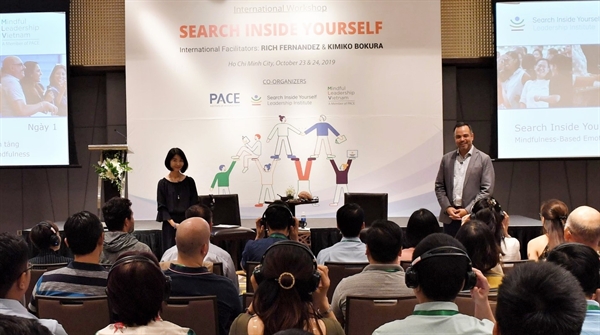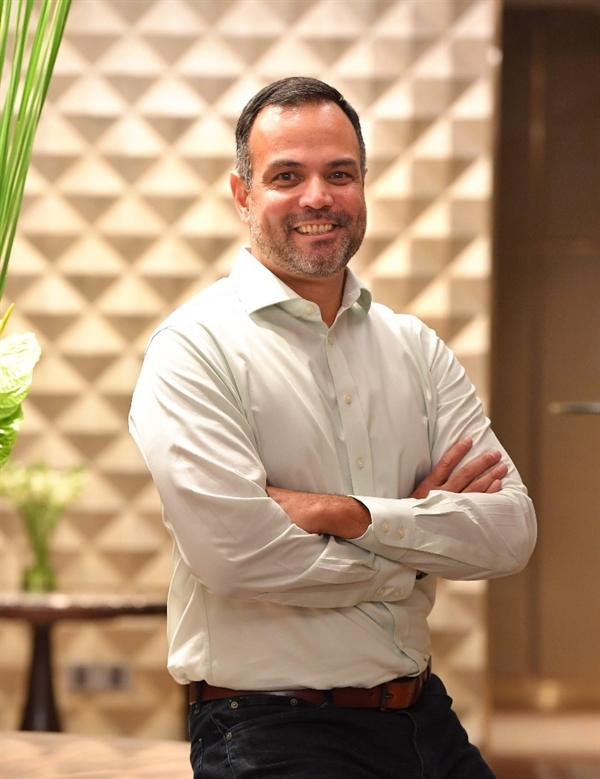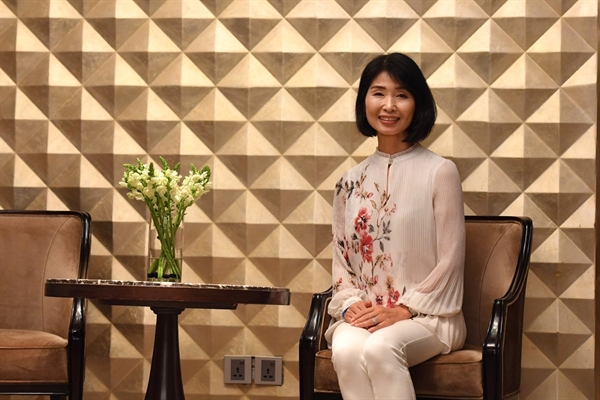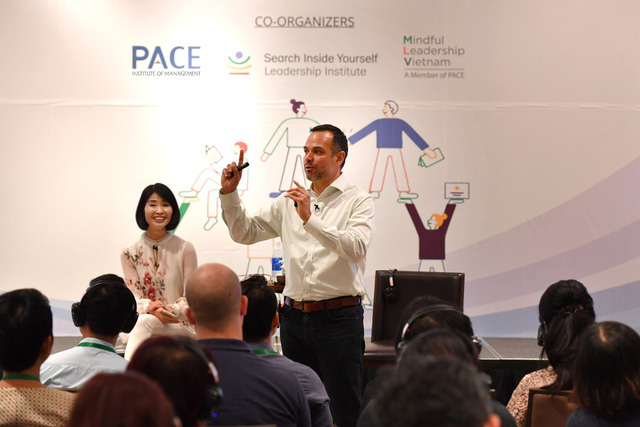PACE INSTITUTE OF MANAGEMENT BRINGS "SEARCH INSIDE YOURSELF" - THE WORLD FAMOUS TRAINING PROGRAM IN "MINDFUL LEADERSHIP" TO VIETNAM
Mindful Leadership Vietnam - a member of PACE Institute of Management (PACE-MLV) and Search Inside Yourself Leadership Institute (SIYLI) co-organized Search inside yourself (SIY) program on October 23 & 24, 2019 in Ho Chi Minh City.
Search inside yourself (SIY) - The world famous training program in "Mindful Leadership" has been developed by leading experts in Mindfulness, Neuroscience and Emotional Intelligence.

Approximately 150 domestic and foreign business leaders participated
the "Search Inside yourself" course organised by PACE-MLV.
For the first time in Vietnam, business leaders had the UNIQUE opportunity to DIRECTLY experience with Dr.RICH FERNANDEZ (CEO of SIY Institute Worldwide) and Ms KIMIKO BOKURA (The first SIY teacher in Japan).
We had a private interview with these two famous lecturers about "Mindful Leadership" during their time in Vietnam.
“Mindful Leadership” has become a new trend of leadership today. Could you tell us what “Mindful Leadership” is? Having been holding leadership roles in several years, in your opinion, why is “Mindful Leadership” important?
Dr.Rich Fernandez: Mindfulness is one way to cultivate wise, effective and beneficial leadership. The essence of mindfulness is awareness. Being mindful means to be aware of oneself (thoughts, emotions, intentions and perceptions), to be aware of other people (their thoughts, emotions, intentions and perceptions) and to be aware of the larger environment. The reason there has been so much interest in “mindful leadership” is because in these increasingly complex, volatile and changing times, we need leaders more than ever who can respond skillfully to challenging people and situations. Also, mindfulness puts leaders in touch with their own values and intentions, and allows leader to exercise mental clarity and emotional balance. The result is leadership and organizations that are high performing, sustainable and beneficial to all internal and external stakeholders.
When leaders exercise mindfulness, they can shape an organization’s cultural and values to be beneficial to stakeholders and the bottom line together. Google, for example, had a philosophy in which we actively aspired to create the “healthiest, happiest and most productive workforce on the planet.” We knew that you couldn’t get to the third outcome – most productive workforce – without investing in the first and second areas – a healthy and happy workforce.

Dr.Rich Fernandez - CEO of SIY Institute Worldwide.
Talking about “Mindful Leadership”, we cannot forget to mention “mindfulness”. Mindfulness has existed for a very long time, so according to you, why not until now have “mindfulness” in general and “mindful leadership” in particular become a “hot trend”?
Ms.Kimiko Bokura: Before mindfulness, we had been focusing on skills and knowledges such as logical thinking, team building, or knowledge/capabilities such as programming, accounting, etc. specific for our jobs. However, many people started to notice that these skills and capabilities were not enough to address challenges of the aforementioned VUCA world. Many of us were still overwhelmed and exhausted.
This was when the people who practice mindfulness started to attract attention. In the midst of these challenges, they maintain their focus, innovation, and performance with the example of Steve Jobs and other silicon valley giants. Many people started to follow these and found out how helpful mindfulness is to balance the business outcome and their own well-being at the same time.
Additionally, science of mindfulness also caught up, and many researches revealed the positive impact of mindfulness practice on our brain and health. This boosted the legitimacy of mindfulness practice making it a trend.

Ms.Kimiko Bokura - Mindful Leadership Japan's Founder
In the new stage of development, many Vietnamese enterprises are still following material values such as profit. Other values like mindfulness, emotional intelligence, self-awareness, compassion...are still considered far-fetched. In your opinion, do Vietnamese businesses need to change such mindset?
We have been delivering our SIY curriculum for over 10 years now in over 50 countries around the world. We measure the effects of SIYLI pre and post program, and some of our client organizations have measured the sustained effects as far as 6 months after training. We have found some statistically significant changes in participant’s reported levels of performance effectiveness, leadership and wellness as a result of the program. Some outcomes include:
- SIY Participants reported a greater ability to focus and optimize their mental state. In terms of prioritization for example, 49% of pre-program participants report that they take time to prioritize versus 71% post program.
- SIY Participants reported greater resilience and mental readiness to meet daily challenges: for example, 34% reported being able to bounce back after a challenging situation pre-program, versus 60% post-program
- SIY participants reported increased ability to maintain calm and poise in challenging situations, from 34% pre-program to 60% post-program.
We also have some very compelling case study and return-on-investment data and the value of SIY to organizations. One of our major client is SAP, the German enterprise software company. Every year we put thousands of their employees through the SIY curriculum, and the outcomes are quite compelling. We know for instances that SIY participants report 6.5% greater employee engagement, 9.2% better well being, 13.8% better ability to focus, -7.6% less stress, 6.9% better communication and 5.2% better collaboration pre versus post SIY.
SAP has also published results indicating that every 1% increase in employee well being equates to 85-95 million euro per year in operating profit, and every 1% increase in employee engagement equates to 50-60 million euro in operating, and that SIY increases both of those aspects of employee experience by 9.2% and 6.5% respectively. You can see there is a direct benefit for running SIY in an organizations such as SAP. In fact SAP has indicated there is a 200% return on investment on SIY and mindfulness programming. And SAP was recently voted one of best places to work in the world. So mindfulness isn’t just a “nice to have” offering, it makes good business sense.

Dr.Rich Fernandez và Ms.Kimiko Bokura discuss about "Search Inside Yourself"
with participants.
For many people, mindfulness has been associated with Buddhism, but for SIY, mindfulness relates to emotional intelligence and neuroscience with an aim to develop leadership. Could you share your insights on this?
Ms.Kimiko Bokura:
Although the state and attitude of mindfulness is emphasized in Buddhism, it is about how we can optimize our most important resource=attention, so the concept of mindfulness is not exclusive to Buddhism.
In SIY, all the contents and methodologies are based on research and science, not certain beliefs, and many researches confirm that the practice of mindfulness enhances leadership, performance, and well-being.
According to you, “Mindfulness” in general and "Mindful Leadership" in particular are just a temporary trend, or the future of the world?
Dr.Rich Fernandez:
Mindfulness and mindful leadership are not just brief trends, in the same way that having great employee health and wellness is not a trend but leads to sustainable high performance of individuals and organizations.
Recently Deloitte published their Human Capital Trends Survey 2018 and found that increasingly teams are operating as networks, such that internal collaboration and agility are top competencies within organizations. But what are leaders really doing to promote agility and collaboration?
I believe creating more mindful and compassionate work cultures promotes psychological safety and well being and as a result people are able to be their best, feel good about collaborating and deliver the best possible results time and again. This leads to sustainable organizations, and mindful leadership is the key so it’s here to stay. Google is a good example of this, but so are companies Like Starbucks, Microsoft and Ford Motor company, all of whose leaders integrate mindfulness into their leadership. The question is how many leaders are really investing in building mindfulness, compassion and wellness into their cultures? We need more leaders to do so. Because we know the highest performing and best places to work are those that have these qualities of engagement, wellness and mindfulness.
Source CafeF
|
On November 13 & 14, 2020 in Ho Chi Minh City, Vietnam The world famous training program in "Mindful Leadership"
Please click HERE for more information |
- Seminar: ELEVATING LEADERSHIP WITH EMOTIONAL INTELLIGENCE IN THE AI ERA
- FBNC: 150 BUSINESS LEADERS HAD THE UNIQUE OPPORTUNITY TO DIRECTLY EXPERIENCE WITH SEARCH INSIDE YOURSELF
- HTV9: SEARCH INSIDE YOURSELF (SIY) - THE WORLD FAMOUS TRAINING PROGRAM IN "MINDFUL LEADERSHIP"
- PACE INSTITUTE OF MANAGEMENT BRINGS "SEARCH INSIDE YOURSELF" - THE WORLD FAMOUS TRAINING PROGRAM IN "MINDFUL LEADERSHIP" TO VIETNAM
- “SEARCH INSIDE YOURSELF”: THE WORLD FAMOUS TRAINING PROGRAM IN "MINDFUL LEADERSHIP" IS NOW IN VIETNAM






